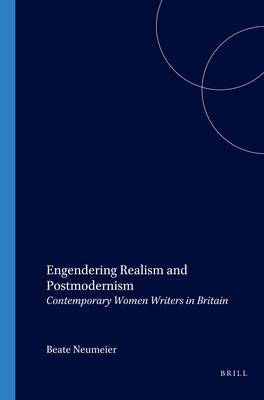
- Afhalen na 1 uur in een winkel met voorraad
- Gratis thuislevering in België vanaf € 30
- Ruim aanbod met 7 miljoen producten
- Afhalen na 1 uur in een winkel met voorraad
- Gratis thuislevering in België vanaf € 30
- Ruim aanbod met 7 miljoen producten
Zoeken
Engendering Realism and Postmodernism
Contemporary Women Writers in Britain
€ 195,45
+ 390 punten
Omschrijving
This volume assembles critical essays on, and excerpts from, works of contemporary women writers in Britain. Its focus is the interaction of aesthetic play and ethical commitment in the fictional work of women writers whose interest in testing and transgressing textual boundaries is rooted in a specific awareness of a gendered multicultural reality. This position calls for a distinctly critical impetus of their writing involving the interaction of the political and the literary as expressed in innovative combinations of realist and postmodern techniques in works by A. S. Byatt, Maureen Duffy, Zoe Fairbairns, Eva Figes, Penelope Lively, Sara Maitland, Suniti Namjoshi, Ravinder Randhawa, Joan Riley, Michele Roberts, Emma Tennant, Fay Weldon, Jeanette Winterson. All contributions to this volume address aspects of these writers' positions and techniques with a clear focus on their interest in transgressing boundaries of genre, gender and (post)colonial identity. The special quality of these interpretations, first given in the presence of writers at a symposium in Potsdam, derives from the creative and prosperous interactions between authors and critics. The volume concludes with excerpts from the works of the participating writers which exemplify the range of concrete concerns and technical accomplisments discussed in the essays. They are taken from fictional works by Debjani Chatterjee, Maureen Duffy, Zoe Fairbairns, Eva Figes, Sara Maitland, and Ravinder Randhawa. They also include the creative interactions of Suniti Namjoshi and Gillian Hanscombe in their joint writing and Paul Magrs' critical engagement with Sara Maitland.
Specificaties
Betrokkenen
- Uitgeverij:
Inhoud
- Aantal bladzijden:
- 428
- Taal:
- Engels
- Reeks:
- Reeksnummer:
- nr. 32
Eigenschappen
- Productcode (EAN):
- 9789042014374
- Verschijningsdatum:
- 1/01/2001
- Uitvoering:
- Paperback
- Formaat:
- Trade paperback (VS)
- Afmetingen:
- 150 mm x 220 mm
- Gewicht:
- 734 g

Alleen bij Standaard Boekhandel
+ 390 punten op je klantenkaart van Standaard Boekhandel
Beoordelingen
We publiceren alleen reviews die voldoen aan de voorwaarden voor reviews. Bekijk onze voorwaarden voor reviews.







